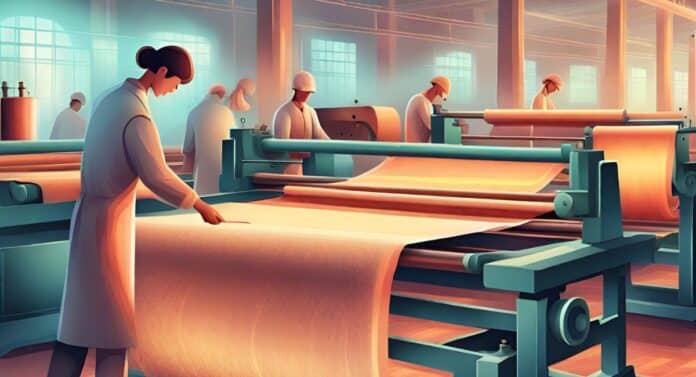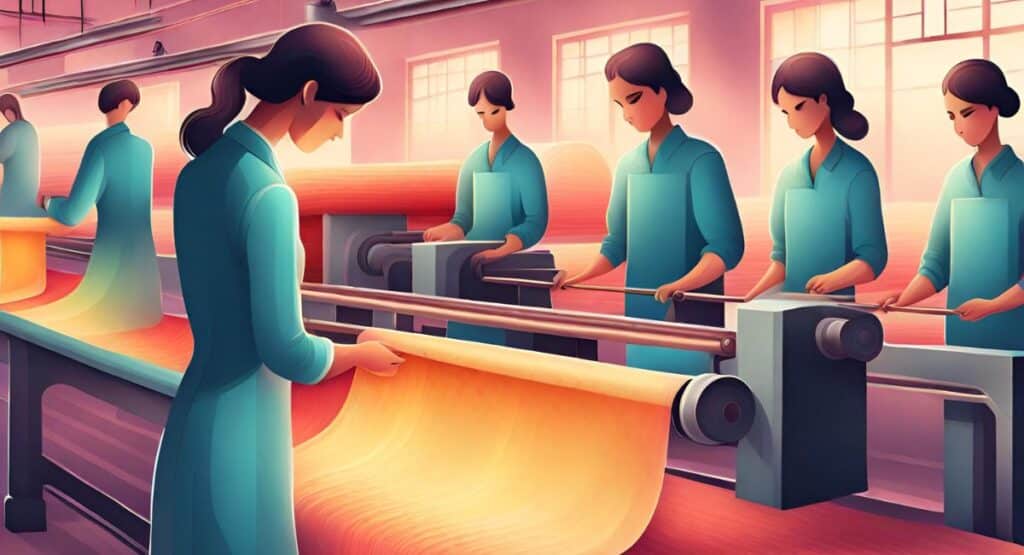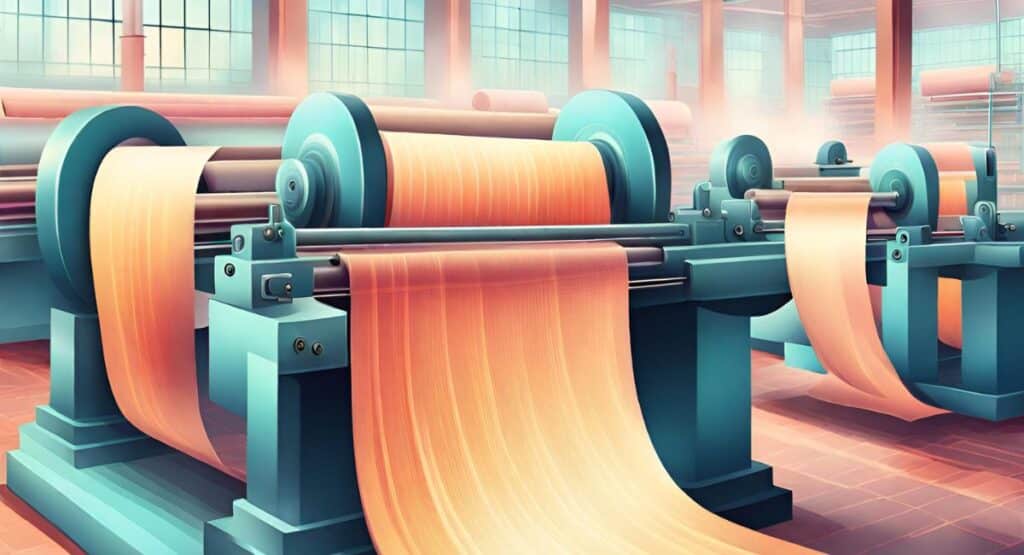Welcome to our guide on textile manufacturing trends in Singapore. We explore the industry’s dynamic landscape, from production processes to market insights.
Singapore’s textile sector has seen significant growth as a global trade hub. With advanced factories and a skilled workforce, Singapore excels in textile production. The industry includes weaving, spinning, dyeing, and finishing processes, ensuring high-quality textiles.
Singaporean textile companies use cutting-edge machinery to optimize productivity and efficiency. Automated production lines and computerized systems help maintain stringent quality standards. Singapore is a hub for sustainable textile production, using eco-friendly materials like organic cotton and recycled fibers. This meets the growing demand for sustainable textiles.
Singapore offers diverse textile materials, from natural fibers like cotton and silk to synthetics like polyester and nylon. This supports industries like fashion, interior design, and textile manufacturing.
The competitive textile market in Singapore includes both domestic and international players. The industry adapts to changing trends, technology, and sustainability needs, ensuring future growth. We will delve deeper into the textile fabric market, key drivers and challenges, COVID-19 impact, and market players. Stay tuned for insights and analysis!
Key Takeaways
|
Table of Content:
Table of Content

Growth of the Singapore Textile Fabric Market
The Singapore textile fabric market is experiencing significant growth fueled by the increasing demand from industries such as fashion, interior design, and manufacturing. As fashion trends constantly evolve and interior decoration preferences change, the demand for textile fabrics continues to rise. Additionally, advancements in fabric production techniques and technologies are driving market expansion.
Singapore textile manufacturers, with their focus on quality and innovation, are well-positioned to meet the demands of both local and international customers. The integration of digital technologies into fabric design and production processes further enhances their capabilities and strengthens their competitive advantage.
As consumers become more conscious of sustainability, there is a growing demand for unique and eco-friendly fabrics. Singapore’s textile fabric market is poised to meet this demand, leveraging technological advancements and innovative approaches to produce sustainable textiles.
With the sustained growth of the fashion industry, coupled with the increasing importance of interior design and the continuous technological advancements in fabric production, the Singapore textile fabric market’s trajectory remains positive. The market’s expansion offers exciting opportunities for businesses operating in this sector.
Drivers of the Singapore Textile Fabric Market
The Singapore textile fabric market is driven by several key factors that contribute to its growth and success. One of the main drivers is the increasing demand for sustainable fabrics in the global fashion industry. As consumers become more conscious about the environmental impact of their clothing choices, there is a growing interest in eco-friendly fabrics, such as silk.
Silk, known for its natural sheen, luxurious feel, and comfort, has become a sought-after material in the fashion and home textiles sector. Its eco-friendly properties further enhance its appeal, making it a popular choice for discerning customers. The demand for silk yarn in the market continues to rise, driving the growth of the Singapore textile fabric market.
Another driver of the market is Singapore’s strategic location as a trade hub. Situated at the crossroads of major trading routes, Singapore facilitates the import and export of silk yarn, strengthening its position in the global textile industry. The country’s efficient logistics and well-established trade networks ensure a seamless flow of silk materials, enhancing the market’s competitiveness.
Innovations in silk production techniques also play a significant role in driving the market forward. With ongoing research and development, silk manufacturers in Singapore are constantly improving their production processes to meet the evolving demands of the fashion industry. These advancements help maintain the quality and integrity of silk fabrics, ensuring their position as a preferred choice among designers and consumers.
Furthermore, the introduction of eco-friendly silk varieties contributes to the growth of the market. Manufacturers have been exploring sustainable methods of silk production, such as using organic dyes and reducing water consumption. By offering eco-friendly alternatives, Singapore’s textile fabric market aligns with the increasing consumer preference for sustainable fashion, further fueling its expansion.
Challenges in the Singapore Textile Fabric Market
The Singapore textile fabric market faces several challenges, primarily driven by international competition. International competition poses a significant threat to domestic manufacturers, as low-cost textile imports from countries with cheaper labor and production costs flood the market. In order to stay competitive, local manufacturers must find ways to maintain product quality and innovation while offering competitive pricing.
Another challenge for the textile fabric market is the need to adapt to rapidly changing fashion trends and consumer preferences. The industry must constantly keep up with the latest fashion trends to stay relevant and meet the demands of customers. This requires agility and a deep understanding of consumer behavior.
Sustainability concerns also present challenges for the Singapore textile fabric market. With increasing concerns about the environment, both regulatory and consumer-driven, the industry is under pressure to adopt eco-friendly dyes and manufacturing processes. This requires significant investment in research and development to develop sustainable alternatives while ensuring compliance with industry regulations.
Addressing these challenges and finding a balance between international competition, product quality, innovation, and sustainability concerns is crucial for the success of the Singapore textile fabric market.
Impact of COVID-19 on the Singapore Textile Fabric Market
The Singapore textile fabric market experienced a significant impact as a result of the ongoing COVID-19 pandemic. With the implementation of lockdowns and restrictions, there was a sharp decline in the demand for textile fabrics, especially in the clothing sector.
The closure of retail stores and reduced consumer spending further exacerbated the negative effects on the market. As people adhered to social distancing measures, traditional brick-and-mortar shopping became less feasible, leading to a notable shift towards online shopping for textiles and fabrics. This shift, although not enough to fully offset the decline in demand, provided some relief to the industry.
Key Players in the Singapore Textile Fabric Market
In the Singapore textile fabric market, companies like Singtex Industrial Co. and Pac-Fung Feather Company are significant players, offering a wide range of textile fabrics for various applications in the fashion and textile industry. These companies focus on delivering high-quality fabrics and staying ahead of market trends to meet the diverse needs of their customers. Their presence in the market ensures a competitive landscape and drives innovation in textile fabric manufacturing.
Functional Textile Finishing Agents Market Insights
The functional textile finishing agents market plays a crucial role in enhancing the performance and functionality of textile materials. With the increasing demand for functional textiles in industries such as automotive, healthcare, and sports, this market is projected to grow at a CAGR of 5.64% during the forecast period (2023-2030), reaching a market size of USD 5.24 billion by 2030.
The growth of the functional textile finishing agents market can be attributed to various factors. The demand for textiles with enhanced properties, such as antimicrobial and flame retardant agents, is driven by the need for increased safety and hygiene standards in diverse applications. The sports industry, for instance, requires functional textiles that wick away moisture and provide thermal regulation to enhance performance and comfort.
While the market presents significant growth opportunities, it also faces certain challenges. High production costs associated with functional textile finishing agents and strict regulations on chemical usage pose threats to market growth. Companies operating in this sector must strike a balance between meeting regulatory requirements and delivering innovative solutions.
Businesses in the functional textile finishing agents market need to understand market dynamics and trends to capitalize on the growing opportunities. By identifying the drivers and restraints of the market, companies can devise strategies to leverage their strengths and mitigate potential threats. This market presents immense potential for those who can provide effective and sustainable solutions to meet the evolving needs of the textile industry.
Key Players in the Functional Textile Finishing Agents Market
The functional textile finishing agents market in Singapore is highly competitive. Key players drive innovation and provide various solutions. These include BASF, DOW Chemicals, FCL, Sumitomo Chemicals, Evonik Industries, HT Fine Chemical, Archroma, Bayer, Rudolf, Lubrizol Corporation, and Huntsman Corp.
These leaders develop and supply functional textile finishing agents for the evolving industry. Their commitment to research and development helps them improve products and stay ahead.
These companies meet manufacturers’ and consumers’ demands with extensive offerings and innovation. They are trusted partners for textile businesses, enhancing performance, durability, and sustainability.
To stay competitive, they invest in technologies, adopt sustainable practices, and collaborate with partners. Their market presence significantly contributes to the industry’s growth in Singapore.
Market Segmentation of Functional Textile Finishing Agents
The functional textile finishing agents market is highly diverse and segmented based on the type of agents used, each offering unique functionalities to enhance the performance and functionality of textile materials. Understanding these segments and their applications is essential for businesses operating in this market.
Antimicrobial/Anti-inflammatory Agents
Antimicrobial/anti-inflammatory agents are designed to inhibit the growth of bacteria and reduce inflammation in textile materials. These agents help to maintain hygiene, prevent odor, and promote comfort in a wide range of applications, including medical textiles, activewear, and bedding.
Flame Retardant Agents
Flame retardant agents provide textiles with the ability to resist or delay the spread of flames, protecting both the wearer and the surrounding environment from the risk of fire. These agents are crucial in applications such as protective clothing, upholstery, and automotive interiors.
Repellent and Release Agents
Repellent and release agents create a protective barrier on textile surfaces, preventing the absorption of liquids or dirt and facilitating easy removal of stains. These agents are commonly used in outdoor apparel, tactical gear, upholstery, and home textiles to enhance durability and ease of maintenance.
Temperature Regulation Agents
Temperature regulation agents help textiles adapt to different temperatures, providing comfort and maintaining an optimal microclimate for the wearer. These agents can either retain heat or promote breathability, making them suitable for a range of applications, including sportswear, outdoor clothing, and bedding.
Durable Press/Wrinkle Resistant Agents
Durable press/wrinkle-resistant agents are designed to minimize creasing and wrinkling in textile materials, allowing garments to maintain their shape and appearance for longer periods. These agents are widely used in formal wear, workwear, and household textiles to reduce ironing and improve overall garment longevity.
Regional Analysis of the Functional Textile Finishing Agents Market
The regions of North America, Europe, Asia-Pacific, South America, and the Middle East and Africa divide the functional textile finishing agents market. Each region has a unique market size and share, influenced by textile trends, economic conditions, and consumer preferences. Understanding these regional dynamics is crucial for companies seeking market expansion.
North America has a significant market share due to established textile industries and product innovation. The region’s commitment to sustainable manufacturing also strengthens its market leadership.
Europe is another key player in the functional textile finishing agents market. The region’s advanced textile production techniques and stringent quality standards drive market growth. Additionally, European consumers’ increasing demand for functional and sustainable textile products further boosts the market.
Asia-Pacific is a rapidly growing market for functional textile finishing agents. The region’s thriving textile industry, particularly in countries like China, India, and Japan, drives market expansion. Asia-Pacific’s large population and rising disposable incomes also contribute to the growing demand for functional textile products.
In South America, the Middle East, and Africa, the functional textile finishing agents market is witnessing steady growth. Increasing investments in the textile industry, coupled with growing consumer awareness about functional textiles, fuel market development in these regions. Manufacturers in these regions are focusing on product development and strategic partnerships to tap into the market’s potential.
Conclusion
In conclusion, the textile manufacturing industry in Singapore is poised for continuous growth and innovation. With its strategic location, state-of-the-art machinery, and commitment to sustainability, Singapore remains a competitive hub for textile production. As the industry adapts to evolving trends and consumer demands, companies that leverage advanced technologies and sustainable practices will lead the market.
If you’re looking to stay ahead in the dynamic textile manufacturing landscape, consider exploring the benefits of Hash Manufacturing software by HashMicro. Our comprehensive solution is designed to optimize your production processes, enhance efficiency, and ensure superior quality control. Experience the future of textile manufacturing with our cutting-edge software. Sign up for a free demo and see how Hash Manufacturing can transform your operations.



































